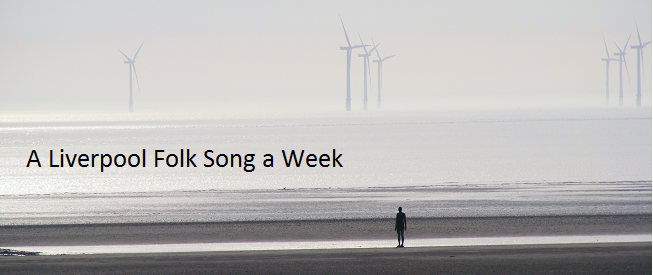Friday 27 April 2012
46: The Ellan Vannin Tragedy
A song written in 1961 by Hughie Jones of Liverpool folk group The Spinners. (Hughie Jones is, of course, still an active part of the Liverpool folk scene; he runs the Everyman Folk Club, which due to the refurbishment of the Everyman met for a while in the Fly and the Loaf but has now moved to a new venue on the corner of Oldham Street and Roscoe Street.) This song commemorates the loss of the SS Ellan Vannin, which sank in 1909.
The SS Ellan Vannin was an iron paddle steamer with the Isle of Man Steam Packet company, and was built in Glasgow in 1860. In the early hours of 3 December 1909, the Ellan Vannin set sail from Ramsey for Liverpool with passengers, cargo, and mail, but during the journey weather conditions deteriorated. By the time Ellan Vannin had reached the Mersey Bar lightship, the waves were over 25 feet high, with winds of 80 miles per hour. The ship sank, and all 21 crew members and 15 passengers drowned.
The image above is a depiction of the disaster drawn by Arthur Burgess and printed in The Graphic newspaper of December 25 1909 - I found it on The Wreck Site, an online database of shipwrecks.
Friday 20 April 2012
45: Poor Paddy Works on the Railway
A song celebrating (or should I say commiserating?) the Irish navvy at work; this version was collected from Albert Gillmore of Birkenhead and published in The Shuttle and Cage: Industrial Folk Ballads edited by Ewan MacColl. Gibb Schreffler, whose knowledge of shanties is greater than my own, has made me aware that the tune here is very similar not only to that used by Stan Hugill, but also one published by Whall in Ships, sea songs, and shanties, so it seems (possibly unlike other variations e.g. that collected from Newton Heath Railway Shed, Manchester and also published by MacColl) that what we have here is a version used at sea.
Although now very much sung by people with their feet on dry land - slightly further south in Cheshire it was even popular with fans of Crewe Alexandra ("the railwaymen") - this song has a long Liverpool association from its use as a capstan shanty. Edward Keble Chatterton, in a 1923 book called The Mercantile Marine, quotes Liverpool shipowner Sir William B. Forwood: "On the morning of the 20th November, 1857, I embarked by a tender from the Liverpool pierhead. It was nearly the top of high water. The crew were mustered on the forecastle, under the 1st Mate, Mr. Taylor. An order comes from the quarter-deck. ' Heave up the anchor and get away.' Aye, aye, sir.' 'Now then, my boys, man the windlass,' shouts the Mate, and to a merry chantie:
'In 1847 Paddy Murphy went to Heaven
To work on the railway, the railway, the railway,
Oh, poor Paddy works upon the railway'
'The anchor is away, sir,' shouts the Chief Officer. 'Heave it a-peak and cathead it,' comes from the quarter-deck, and the tug retriever forges ahead and tightens the tow-rope as we gather way. Bang, bang went the guns, and twice more, for we were carrying the mails, and good-bye to old Liverpool, and the crowds which lined the pierhead cheered, for the Red Jacket was already a famous ship, and it was hoped she would make a record passage."
Irish navvies in their thousands were responsible for work on many of the wonders that made Liverpool a great 19th century power, including the construction Liverpool-Manchester Railway, the world's first inter-city passenger railway. In spite of their essential role for the economy, however, at the time they were more often associated with criminality and disorder, as noted by Roger Swift in The Irish in Britain, who describes "three days of fierce fighting between 300 Irish navvies and 240 English railway labourers engaged on the line of the Chester and Birkenhead Railway" in 1839.
The Daniel O'Connell referred to in the fifth verse was the Irish Member of Parliament who lived from 1775-1847, campaigner for Catholic Empancipation and the separation of Ireland from the Union.
The Spinners sang a different version of this song under the title 'Fillimiooriay'; the song has travelled widely, as witnessed by the existence of American versions with titles like 'Poor Paddy Works on the Railroad' and 'Poor Paddy Works on the Erie'. It is #208 in the Roud folksong index.
Wednesday 18 April 2012
Reboot
Just writing a quick line to say that after a short hiatus, I'm ready to get back into the swing of things here. Temporary loss of hearing took some of the pleasure out of singing for a while, but I've recovered and just enjoyed a great couple of weeks in Liverpool getting my voice back, singing at the Ellesmere Port Shanty Festival and at the singarounds in St. Stephens, the Lion Tavern, and the Derby Arms (Aughton). So I'm very excited to start up my project here again; I plan on posting song number 45 this Friday.
Sadly, a year has now passed since I started, so I haven't reached my target of singing a song a week for a year, but these things happen; and at least this means that I can free myself of the artificial restriction of singing only 52 songs! I now plan on carrying this project through to 60 songs. Which means you'll be stuck with me for a bit longer...
Sadly, a year has now passed since I started, so I haven't reached my target of singing a song a week for a year, but these things happen; and at least this means that I can free myself of the artificial restriction of singing only 52 songs! I now plan on carrying this project through to 60 songs. Which means you'll be stuck with me for a bit longer...
Subscribe to:
Posts (Atom)


